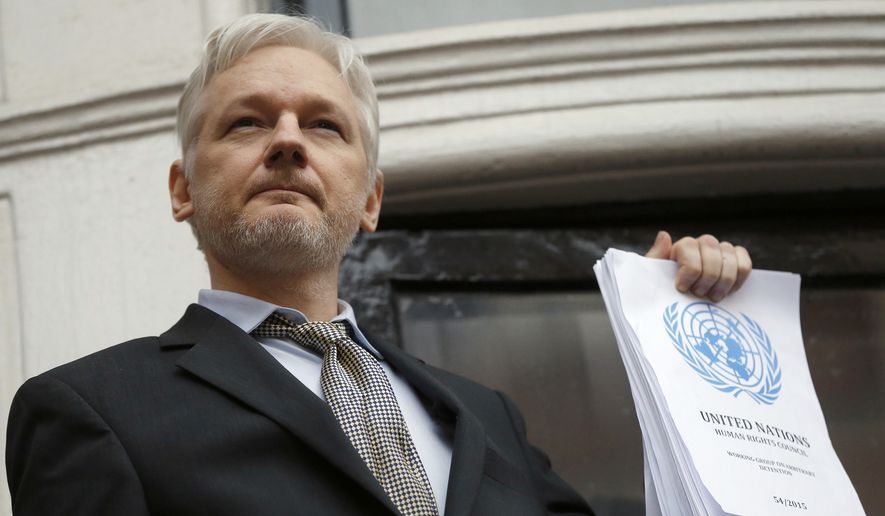United Nations experts asked British authorities on Friday to abandon their pursuit of WikiLeaks publisher Julian Assange and allow him to safely leave the Ecuadorian Embassy in London without being arrested and extradited to the United States.
The United Nations Working Group on Arbitrary Detention repeated the request in a statement issued from Geneza, Switzerland, more than three years after the same panel determined that the ongoing impasse surrounding Mr. Assange has deprived him of his liberty in violation of international law.
“It is time that Mr. Assange, who has already paid a high price for peacefully exercising his rights to freedom of opinion, expression and information, and to promote the right to truth in the public interest, recovers his freedom,” the working group reiterated.
Mr. Assange, 47, entered the Ecuadorian Embassy over six years ago in lieu of surrendering to British authorities and being extradited to Sweden, where prosecutors had hoped to question him over allegations of sexual assault. He feared Sweden would send him to the U.S., however, particularly in light of the Department of Justice conducting an ongoing criminal investigation involving his WikiLeaks website and its long history of releasing classified government documents.
Ecuador subsequently granted asylum and citizenship to Mr. Assange in 2012 and 2017, respectively, and Swedish prosecutors ended the rape probe in the interim without filing charging.
But an outstanding British arrest warrant and the risk of being extradited to the U.S. has precluded the WikiLeaks publisher from exiting the embassy, effectively creating a condition the U.N. working group has found to be in violation of both the Universal Declaration of Human Rights and the International Covenant on Civil and Political Rights.
“The Swedish investigations have been closed for over 18 months now, and the only ground remaining for Mr. Assange’s continued deprivation of liberty is a bail violation in the UK, which is, objectively, a minor offense that cannot post facto justify the more than 6 years confinement that he has been subjected to since he sought asylum in the Embassy of Ecuador,” the working group said Friday.
“Mr. Assange should be able to exercise his right to freedom of movement in an unhindered manner, in accordance with the human rights conventions the U.K. has ratified,” the experts said.
The Justice Department has refused to confirm or deny whether Mr. Assange is the subject of a criminal investigation, notwithstanding a recent court filing suggesting he has been quietly charged under seal. Prosecutors said the filing was made in error and are currently fighting in federal court against disclosing information related to any potential charges pending against the WikiLeaks publisher.
A lawyer for Mr. Assange previously said he would be willing to leave the Ecuadorian Embassy and surrender to U.K. authorities if British authorities promise not to extradite him to the U.S.
WikiLeaks has published sensitive material ranging from classified U.S. Department of State diplomatic cables in 2010, to CIA hacking tools in 2017, among other material.
President Trump praised WikiLeaks during his 2016 campaign for releasing internal Democratic National Committee documents and emails stolen from the chairman of Democratic candidate Hillary Clinton’s rival campaign, John Podesta.
Mr. Trump has since stated that charging Mr. Assange would be “OK with me.”
• Andrew Blake can be reached at ablake@washingtontimes.com.




Please read our comment policy before commenting.